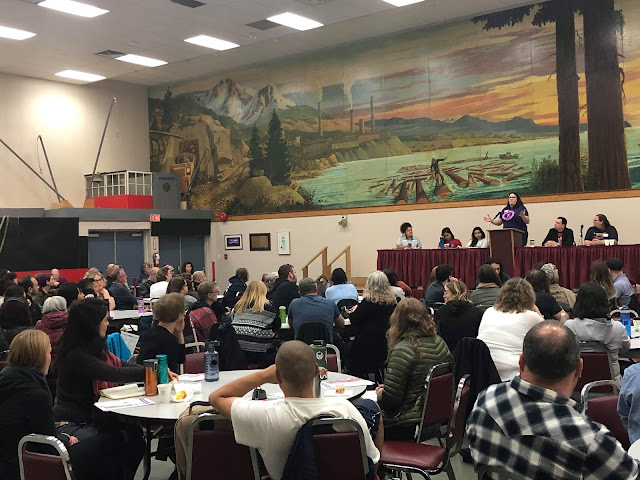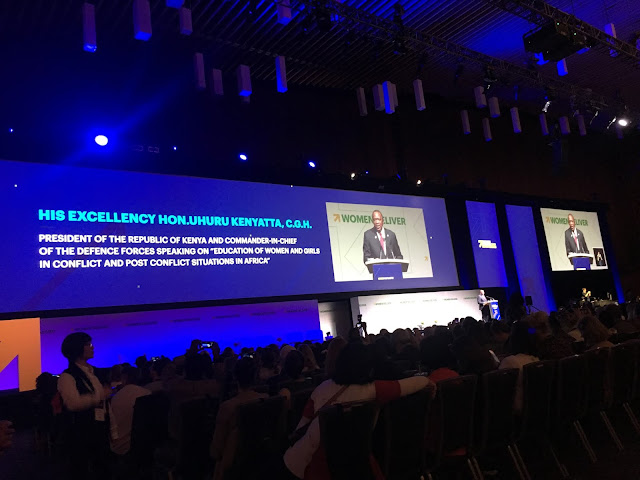Labor Notes Day 2 - Chicago - April 7th
Strikes and Contract Campaigns on Campus
Moderator: Michelle Chen - belabored podcast
Jane Elliott - King's College University and College Union, UK
The union at King's College in the UK hasn't always been radical. For 16+ years morale has been low, with more and more faculty positions going contingent. They had one raise of 1% in 13 years. Then the employer goes after their pensions - threatening to convert their DB pension plan into a DC pension plan.
Workers decided that they had had enough and it was time to fight. Within 14 days they radicalized their membership by actually talking to each other. They partnered with the students who had had some earlier success by demanding that cleaners were brought in-house. It wasn't easy - the membership base was organizing and radicalizing while union leadership was out of touch. The members were clear on what they were and weren't going accept - this time they were hell bent on staying out in order for tighter language and protection of their pension. In the end they protected their pensions but the union is in flux. They took radical action, they had a radical strike, and they radicalized their base but there has not been a change in their internal leadership and the divide is still there.
Cherrene Horazuk - AFSCME 3800 - University of Minnesota
I was so excited to hear from Cherrene. She is my counterpart at the University of Minnesota. Often the voices of support staff are lost in these types of sessions with the focus in higher education mostly on faculty and students so it was awesome that Cherrene was here to share the story of AFSCME 3800.
Their bargaining cycle is every 2 years. Some of the major gains they've been able to achieve are:
- $15 minimum wage
- 6 weeks paid parental leave
- no increase in health insurance
- trans inclusive language
- expose administrative bloat at the University
 There is a multi-union coalition called "University Unions United," which also includes non-union workers. They've also been able to build strong alliances with their undergrads who sound pretty radical - hunger strikes and occupations aren't uncommon. This local feels the responsibility to support the student movement - the employer often tries to divide and conquer by pitting tuition costs up against staff wages. As Cherrene wisely put "it's never a budget crisis but a distraction crisis."
There is a multi-union coalition called "University Unions United," which also includes non-union workers. They've also been able to build strong alliances with their undergrads who sound pretty radical - hunger strikes and occupations aren't uncommon. This local feels the responsibility to support the student movement - the employer often tries to divide and conquer by pitting tuition costs up against staff wages. As Cherrene wisely put "it's never a budget crisis but a distraction crisis."
Challenges:
- only 25% of the workforce at U of Minnesota is unionized
- atomized workplace
- living wage efforts are challenging
- wages at the top of their grid have been frozen for years
- local has challenges with the AFSCME state council
Rutgers is a large university in New Jersey. 70,000 students, 30,000 employees (20,000 of which are unionized. The good news is for the first time ever they are all synced up with common expiration dates. The faculty association is the biggest union with 8,000 members - including 3k FTE, 2k PT, 2k grad students, post docs and counsellors.
One good story was that contract faculty were able to achieve a 43% wage lift last round. Going from $39k to $60k.
Challenges:
- management bloat
- poor communication during bargaining
She talked about open bargaining - they even brought students to the table last time so they could see with their own eyes what the union was up against. It's an interesting idea especially since my experience has always been to keep bargaining behind closed doors. I wish more people could be a part of collective bargaining - it's got me thinking...
Tony Johnston - Cook County Community Colleges
Tony represents the workers at 14 campuses of the Cook County (Greater Chicago) Community College system under three collective agreements - faculty, security and professional staff. This is the second story of how unions members who were unhappy with leadership organized to change. The lack of transparency during prior rounds of bargaining lead to huge distrust of the union and a culture of feeling that members had been sold out by their leadership.
New leadership decided to change things up. They reached out the the Chicago Teachers Union for training. Their employer was undergoing significant consolidation of multiple programs which resulted in layoffs and precocity because of enrolment numbers. By reaching out to other unions and community partners they've had some success in fighting off consolidations, and keeping programs on campuses all over the city, not concentrated in one area. It's ongoing work but as they keep organizing and mobilizing their members they are optimistic for the future.
After the speakers were done, folks in the room had the opportunity to ask questions and to share their stories. I was happy to see CUPE researcher Kevin Skerrett who shared the recent victory of CUPE 2424 at Carleton where they had just settled a 5 week strike over pensions. We heard from a number of contingent faculty members, talking about how their unions often sell them out and that more and more teaching positions are precarious. I got up to ask about alumni networks - we often speak about alliances with students but never alumni. After that part, we broke off into small groups to chat further. I took the opportunity to speak further with Cherrene and we got along like a house on fire.
Such a great start to the second day!
Trans and Queer Politics in Workplace Organizing Drives: Lessons from NYC Sex Toy Store Organizing
 Well this was one of the most interesting an provocative sessions I've attended at a conference in a long time. First off the panel was made up of all queer or trans* people. This was the story of how Babeland and the Pleasure Chest - two sex toy retail stores in New York City and what an interesting story it was...
Well this was one of the most interesting an provocative sessions I've attended at a conference in a long time. First off the panel was made up of all queer or trans* people. This was the story of how Babeland and the Pleasure Chest - two sex toy retail stores in New York City and what an interesting story it was... Lena, one of the panel members was working at Babeland and in 2015 reached out to the Retail Wholesale Department Store Union. Why did the workers feel like they needed a union?
The reason why most workers want a union - safety, job security and support.
For workers at both Babeland and Pleasure Chest are constantly having to deal with all types of harassment. Customers perceive them as sex workers when they are retail workers (no worker should have to put up with harassment). They are subject to harassment in the store, on the phone, verbal and physical. It's not unusual for customers to invade their personal space and then show anger towards them when they tell them to back off. Because of where they work, there's a seemingly automatic sexualization of their bodies - which intensifies for people of colour. So after many encounters like that, a union was the way to go.
And when they unionized, they codified and built a community on the shop floor that extends beyond - they look out for each other wanted to keep each other safe. There was something beautiful about that simple statement. Their narrative was all about how much they care about each other and their safety. Because they were so used to looking out for each other it was natural to organize and their drive was successful - 21-4.
The union itself (RWDSU) also had to adapt to having a local of most queer and trans* workers. They had to become literate in their issues which were:
- expand healthcare coverage
- all union reps to have trans* competency workshops
- pronouns
- all gender restrooms in the union hall
- trans*/ally workbook for the organizing department
- code switching

We then went into really in depth conversations around queer theory, white supremacy, carceral dynamics in the queer community...it was so interesting. Once the panel was over we broke off into small groups for further discussion.
This session was a great example of how a union conference can "level up." This was such an interesting conversation that was quasi-legal, quasi-academic, super progressive and really relevant. One of the highlights for sure!
Higher Education Workers Meeting
There must have been around 150+ plus was this meeting of post-secondary workers. SO many different institutions were represented - UBC, York (shout out to CUPE 3903) who are on strike, Harvard, University of Minnesota, U of California, UMass, Rutgers, CUNY, SUNY, Florida State, U of Chicago, U of Michigan, U of Rhode Island, Mexico...most folks were contingent faculty or grad students but there were some support staff. The issues are really the same no matter where you are. Underfunding, sexual assault, racism, multi-union collaboration, privatization, free speech, PT/FT...we spent the time going around the room and learning from each other.
Canada Meeting
The Canada meeting was weird. What I noticed right away was that 90% of the Canadians at the conference were union staffers. That's pretty indicative of the type of labour movement we have...anyway we separated into various groups. I went into the anti-raiding group to have a discussion on the state of the CLC and the labour movement. The other groups talked about the upcoming Ontario provincial election, a west coast Trouble Makers group emerged, some folks talked about young workers...it was ok.
After we were done I went and hung out with a couple of CUPE reps from the National Office as well as Kari from the BCGEU and a NUPGE rep from Ottawa. We debriefed our days and talked about the future of the labour movement.
All in all a pretty great day - long and full of information.






Comments
Post a Comment